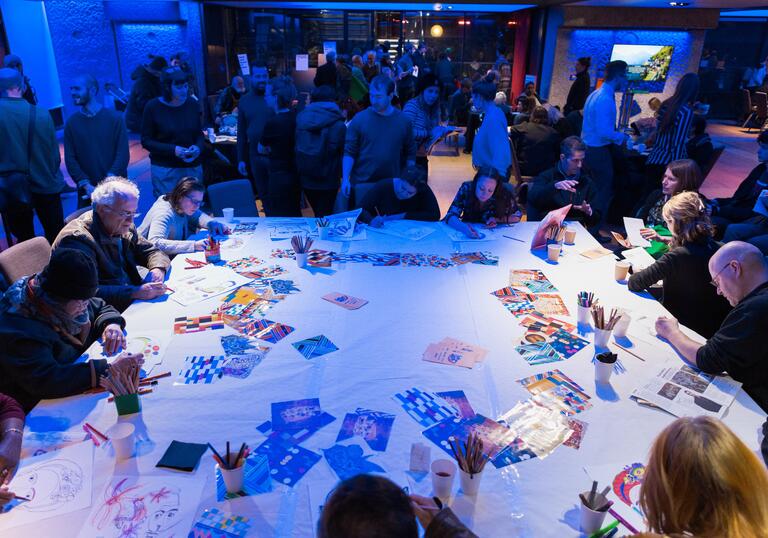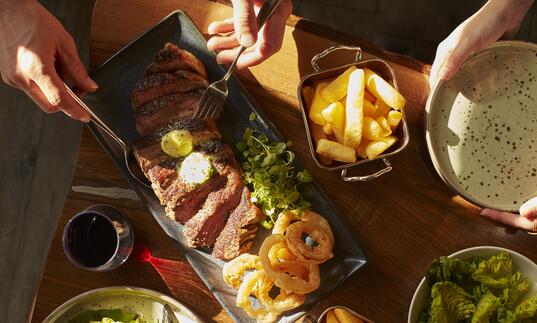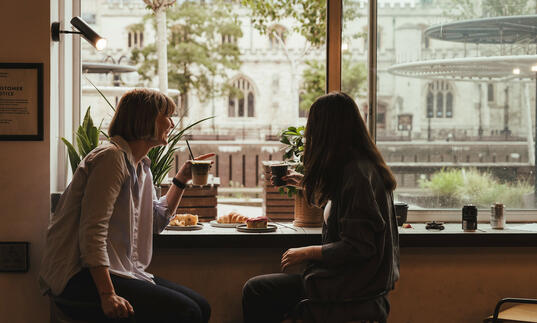
Timings
Exploring relationship centred practice
Conservatory Terrace (Level 4)
12.30-5pm
In the afternoon session join us for lunch and creative workshops from 12.30pm, followed by round table discussions hosted by artists and practitioners that place relationships at the centre of their work. More information about those involved and the questions to be asked will be shared soon.
5 years of Community Collaboration with Headway East London
Garden Room (Level 3) and Conservatory
5.30-7.30pm
Join us in celebrating the 5-year Community Collaborator relationship between brain injury charity Headway East London and the Barbican, with including workshops and artworks from Differently Various, the Curve exhibition co-curated between the Barbican and Headway East London members last year.
More info
What is Relationship Centred Practice?
The Relationships Project defines relationship centred practice as work that ‘…puts relationships first. It unlocks potential and meets need by positioning meaningful and effective relationships as the first order goal, both an end in itself and the means by which other goals will be achieved (like better health, stronger communities, greater job satisfaction).’
How does this fit Barbican’s Communities work?
A relationship-centred approach provides helpful language and frameworks to articulate ways in which we have been working to develop long-term, mutually beneficial partnerships. We want to create work together where people have a meaningful voice, act with agency and make an impact on the organisation.
Our Community Collaborator partnership with Headway East London and our four-year Community Infrastructure Levy funded programmes, like the Imagine Fund and Community Impact Collective, are case studies of how large creative organisations can centre relationships as the foundation to their work within their neighbourhood. Through this way of working creative organisations can respond to the needs of their neighbours and contribute to social infrastructure that fosters a sense of belonging which is vital for people to feel comfortable and welcome in large cultural institutions. In our programmes and partnerships, we want to build relationships with transparency and mutual learning, where power imbalances are named and mitigated and where we hold space for the messy work of building programmes and projects together.
5 years of Community Collaboration with Headway East London
From 2019-2024 the Barbican worked extensively with local charity Headway East London as their first ever “Community Collaborator” - a new partnership designed to develop an in-depth and meaningful two-way exchange with a community partner through prolonged, creative collaboration.
Headway East London is a local charity supporting people affected by brain injury, offering specialist services to over 800 survivors and their families each year. The charity has exceptional artists as members, and the Barbican worked to complement, develop and showcase their work whilst, in turn, they supported our staff and programme to develop in new ways.
Together we worked on a series of projects that encouraged dialogue, collaboration and mutual learning - from curating an online community view for Jean Dubuffet: Brutal Beauty; to writing a poetry anthology, ‘Where a memory lives’, with Barbican Young Poets inspired by Daria Martin: Tonight The World; creating films like Blue Planet Black Hole; dancing on the Barbican theatre stage during lockdown with Michael Clark Dance Company; speaking on panels like Connecting Conversations: Can we be Artists?; launching a Barbican Shop x Submit to Love range; and leading brain injury awareness training for over 60 Barbican staff. The partnership culminated in 2023 with an exhibition in The Curve gallery, differently various, the largest ever exhibition of artwork co-produced by people living with brain injury, which drew 5,500 visitors in 9 days.
Join us to celebrate the achievements of this unique partnership, where you can take part in creative activities from drawing, to clay and poetry; see original artwork dotted throughout the Conservatory alongside photos and videos from projects made during the partnership; learn from our experience through the evaluation report and the Community Collaboration Manifesto; and hear from the Headway members who made it happen.
Further Reading:
The Relationships Project
The Relationship is the Project
Disrupt Toolkit
The Neighbourhood Democracy Movement
Headway East London – supporting people living with brain injury
Access
If you have any access requirements that you would like to discuss ahead of your visit, please email [email protected] or call 020 7101 1188 (Mon - Sun 10am-4pm).
Step-free Access
The Conservatory is split between two levels: Level 4 Conservatory Terrace and Level 3 Conservatory/Gallery Floor. Both can be reached via the main lifts.
The entrance for the afternoon session on the Terrace will be on Level 4, the entrance for the evening celebration with Headway East London will be on Level 3.
Patrons wishing to move between Level 4 and Level 3 can then make their way down by going back out the entrance/exit on Level 4 and taking the external lift. Our staff will be there to assist you down to this lower level, to visit the rest of the venue.
Resources
We have the following resources available on request during the event:
- Ear defenders
- Magnifying sheets
- Fidget toys
- A Dog Bowl for thirsty guide dogs
- Comfort Contego transmitters and receivers available upon request for use during our talks, tours and workshops for dDeaf visitors.
Parking
Find information on accessible parking at the Barbican here.
Facilities
Find information on our accessible facilities at the Barbican here.
Conservatory
Location
The Barbican Conservatory is located on Level 3, if you’re coming from inside the main Barbican building.
From the Barbican highwalks, follow signs to the ‘Barbican Centre’. Walking from Barbican tube station, you’ll see a steps with ‘Art Gallery’ above them, these will lead you up to the Sculpture Court where you'll see a sign for the Conservatory.
Address
Barbican Centre
Silk Street, London
EC2Y 8DS
Public transport
The Barbican is widely accessible by bus, tube, train and by foot or bicycle. Plan your journey and find more route information in ‘Your Visit’ or book your car parking space in advance.


